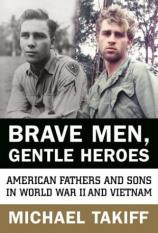Brave Men, Gentle Heroes: American Fathers and Sons in World War II and Vietnam
Review
Brave Men, Gentle Heroes: American Fathers and Sons in World War II and Vietnam
I've been reading about Vietnam for a long time in order to
understand what led America into that conflict --- why we stayed,
who went and who stayed away. And while BRAVE MEN, GENTLE HEROES
didn't answer these questions, it did add another dimension
to my understanding of why men go to war.
I was most interested in reading this book to learn why young men
went to Vietnam. Family influence played a large role; for example,
the sons of fathers who served in World War II may have gone out of
a sense of honor, guilt, family pressure, or tradition. I tried
very hard not to bring my own assumptions to the table; in some
cases these assumptions, that those who went to Vietnam found less
meaning in it, were confirmed.
There are interesting connections to be made between the
generations. Many of the soldiers, especially those who served in
Vietnam, talk about how they can never forget the smells of the
war. Many of the World War II veterans talk about their feet, about
frostbite and how it affects them to this day. None see themselves
as heroes, even though many were viewed as such by their fellow
soldiers and their government.
The differences between the two wars are dealt with clearly and
honestly, both in the stories told and in the author/editor's
notes. Michael Takiff says, "It's comforting to think that the
Allies won World War II because we were the good guys." And that
may help explain our willingness to go into the next war and the
next and the next. But the differences prevail --- the lack of
common understanding of goals, the absence of a "front" to fight on
(one experienced soldier who served in WWII and Korea called
Vietnam the "360-degree war"), and the differences in warfare,
meaning and experiences back home. The older men talk about the
horrors of what they saw; the younger also talk about their anger
against the government, their superior officers, and their dislike
of the war in Vietnam. Many came away baffled at its purpose,
disillusioned by what they experienced. While proud of their
service, this younger generation expresses dismay and talks about
the people of Vietnam, the country, with admiration most of us
might not expect.
There are wonderful tales here --- the scrawny cat that helped a
couple of soldiers avoid mortar attacks, smoking marijuana with the
enemy while on patrol, and the Vietnam soldiers in black Stetsons
who got up on the tables and tap-danced in combat boots.
Takiff provides some explanation for certain events without making
the reader think, "I should have known that." The way he separates
and categorizes the stories told didn't always make sense to me,
but it didn't need to. I also would have appreciated a few more
voices; it's not until you've read for a while that you realize
there aren't too many different people talking in this book.
However, once any of these guys started talking, you pretty much
just read. These guys are, for the most part, ordinary men. But
these are the people who fight wars --- ordinary men. And if you
read this book, do not miss the narratives of Mike Tarbell,
a Mohawk who served in Vietnam. His insight and honesty are
probably worth the entire book.
Don't read BRAVE MEN, GENTLE HEROES all at once. Some stories end
up sounding alike since, in a way, men's war stories are similar.
But each experience is different enough that they all deserve
attention. The book did sag for me in the middle, and I believe it
might have had the same impact with fewer pages. It could have even
benefited from a list of "speakers" in the front, as at times it
was difficult to remember someone who had been introduced 50 or 100
pages earlier.
I don't ordinarily bother commenting on book jackets. However the
cover of BRAVE MEN, GENTLE HEROES is a strong evocation of what's
inside. There are two photos. One is of a WWII soldier, in black
and white. He's calm, and his hair is still showing the lines from
his comb. Looking out past the photographer, he appears to have it
all together. The color photo of the Vietnam soldier tells a
different story. He's disheveled and his hair is mussed. He has a
few days' growth of beard and looks into the lens with red, tired
eyes. Without making it a symbol for the entire book, these two
pictures tell a great deal about what's inside the cover. While
there was no confusion about purpose among the earlier generation
(although a lot of confusion on the ground ensued while fighting,
of course), the far more difficult issues concerning our presence
in Vietnam are evident.
Reviewed by Andi Shechter on January 21, 2011
Brave Men, Gentle Heroes: American Fathers and Sons in World War II and Vietnam
- Publication Date: November 1, 2003
- Hardcover: 560 pages
- Publisher: William Morrow
- ISBN-10: 006621081X
- ISBN-13: 9780066210810



